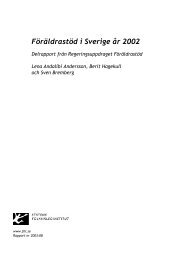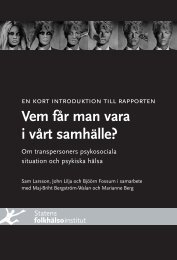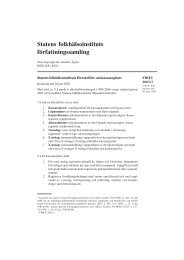Gambling motivation and involvement: A review of social
Gambling motivation and involvement: A review of social
Gambling motivation and involvement: A review of social
Create successful ePaper yourself
Turn your PDF publications into a flip-book with our unique Google optimized e-Paper software.
Studies <strong>of</strong> minority ethnic groups <strong>and</strong> specific age groups<br />
There are a number <strong>of</strong> studies on gambling among minority ethnic groups [90,<br />
325–340]. The perspectives <strong>of</strong> these studies are diverse, but they have in common<br />
that they are occasioned by the assumption or fact that members <strong>of</strong> a minority ethnic<br />
group gamble more than citizens in general <strong>and</strong> that this is a potential or real<br />
problem.<br />
The relatively high propensity to gamble among members <strong>of</strong> minority ethnic<br />
groups is explained as a consequence <strong>of</strong> socio-economic <strong>and</strong> cultural factors. Among<br />
the socio-economic factors discussed are <strong>social</strong> marginalization, low status, relative<br />
poverty, unemployment, <strong>and</strong> little prospect <strong>of</strong> becoming affluent through work.<br />
Such factors push members <strong>of</strong> minority ethnic groups towards the dream world <strong>of</strong><br />
gambling with its illusion <strong>of</strong> quick <strong>and</strong> easy money in abundance. It has also been<br />
suggested that gambling may function as a way to assuage painful emotions that<br />
stem from being an immigrant or refugee, such as alienation, rootlessness, traumatization<br />
<strong>and</strong>, in the case <strong>of</strong> male heads <strong>of</strong> families, loss <strong>of</strong> family authority.<br />
As to cultural factors, it has been proposed that immigrants <strong>and</strong> refugees from<br />
countries where there is little gambling may lose their heads when suddenly confronted<br />
with high availability <strong>of</strong> many forms <strong>of</strong> legal gambling. They bet big <strong>and</strong><br />
recklessly since they have little previous experience <strong>of</strong> gambling <strong>and</strong> unrealistic<br />
beliefs about the chances <strong>of</strong> winning. Certain cultural traits may be highlighted as<br />
explaining high <strong>involvement</strong> in gambling, such as a fatalistic outlook, an overestimation<br />
<strong>of</strong> the importance <strong>of</strong> personal skill, belief in magic, <strong>and</strong> a propensity to take<br />
high risks. Among some ethnic groups, casinos have become popular places for<br />
entertainment <strong>and</strong> <strong>social</strong>izing with compatriots. This may be so because gambling<br />
is a traditional <strong>social</strong> activity, as among the Chinese. It may also be due to distaste<br />
for bars <strong>and</strong> other Western public places for <strong>social</strong>izing that are characterized by<br />
courtship between lone men <strong>and</strong> women, consumption <strong>of</strong> alcohol <strong>and</strong> relatively<br />
frequent violence, <strong>and</strong> <strong>of</strong>ten also which reflect class distinctions. The cosmopolitan,<br />
egalitarian, safe <strong>and</strong> controlled casino appears a more suitable place for an evening<br />
out, meeting old friends, <strong>and</strong> making new ones.<br />
Cultural factors may deter a person with gambling problems from seeking help.<br />
One such factor is a cultural perception <strong>of</strong> heavy gambling as a vice rather than an<br />
addiction or <strong>social</strong> problem, which makes the problem gambler ashamed <strong>of</strong> the<br />
habit <strong>and</strong> reluctant to talk about it. Other factors that have been suggested in the<br />
literature are language problems <strong>and</strong> limited knowledge about help facilities.<br />
The potential beneficial consequences <strong>of</strong> gambling are seldom discussed in the<br />
studies <strong>of</strong> minority ethnic groups. This is a bit surprising, since members <strong>of</strong> such<br />
groups themselves <strong>of</strong>ten point out that visiting gambling venues (i.e. casinos) is a<br />
way <strong>of</strong> breaking <strong>social</strong> isolation in entertainment environments that are perceived<br />
as safe, hospitable <strong>and</strong> non-discriminatory.<br />
Shifting from the subject <strong>of</strong> ethnic groups to age groups, there is quite a substantial<br />
literature on adolescent problem gambling [2, 341–343]. Most <strong>of</strong> this literature<br />
G A M B L I N G M O T I VAT I O N A N D I N V O LV E M E N T 53

















